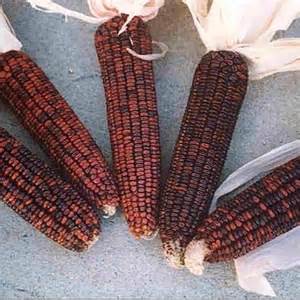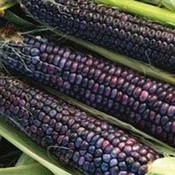Hey guys and gals! Mary here from Mary’s Heirloom Seeds! Today I’d like to separate the facts from fiction about Corn.
 |
| Strawberry Popcorn (heirloom variety) |
First, What is a GMO?
A GMO, or "genetically modified organisms," are plants or animals created through the gene splicing techniques of biotechnology (also called genetic engineering, or GE). This experimental technology merges DNA from different species, creating unstable combinations of plant, animal, bacterial and viral genes that cannot occur in nature or in traditional crossbreeding.
The latest GMO Corn varieties have a built-in pesticide. When a bug consumes the corn, it causes the bug’s stomach to burst. source Is that really something you’d like to eat?
Helpful link: What are Heirlooms, Hybrids & GMOs?
Myth: All Corn seed is GMO
Truth: 90% of commercially raised corn in the US is Genetically Modified.
Unless you purchase a VERY pricey license from Monsanto or a licensed distributor, it is very difficult to purchase GMO Corn Seed.
There is a distinct difference between a HYBRID and a GMO
.
I’ve already explained about GMOs. A Hybrid seed is seed produced by cross-pollinated plants. Hybrid seed production is predominant in agriculture and home gardening.
The benefits of hybrids can be a stronger or more disease-resistant plant. The drawback of growing hybrids is that the seeds saved from the fruit or veggie may be sterile for future planting.
I’ve already explained about GMOs. A Hybrid seed is seed produced by cross-pollinated plants. Hybrid seed production is predominant in agriculture and home gardening.
The benefits of hybrids can be a stronger or more disease-resistant plant. The drawback of growing hybrids is that the seeds saved from the fruit or veggie may be sterile for future planting.
**I have recently learned about technology used to create some hybrids called Cell Fusion. This is a somewhat controversial method and should be labelled GE due to the genetic manipulation that occurs. More info coming soon.**
Myth: All Corn seed is contaminated with GMO
Truth: SOME corn might be contaminated but not all. There are those of us who offer heirloom, non-GMO corn that is Certified Organic and GMO-free.
FACT: Between 1903 and 1983, the world lost over 93% of all seed varieties. Once they’re gone, we cannot get them back! There are several reasons for this loss, they include: contamination, lack of seed saving and disease.
FACT: as far as we know (Monsanto isn't always up front with their "progress") there is no GMO Popcorn. As of 2011, 40% of consumer available Sweet Corn was GMO. That number has grown.
Myth: Monsanto owns all of the heirloom seed companies.
Truth: While Monsanto SELLS seeds (some hybrids and possibly organic varieties) and some of the major seed companies purchase from Monasanto and Syngenta…I can assure you that Mary's Heirloom Seeds has NOT been bought out by Monsanto. There are those of us who are trying to make a difference one garden at a time.
Myth: GMO Popcorn
Truth: As of the date of publishing, there is currently NO GMO Popcorn available commercially for consumption. IF you had a reaction after eating commercial/conventional microwave popcorn it might have something to do with the chemicals, GMO oils and preservatives used in microwave popcorn.
To put it simply, there are 3 types of corn
-Field/Flint Corn
-Sweet Corn
-Popping Corn
If you are concerned with the future of your food supply, I suggest that you consider growing your own organic food from organic seeds.
All of the information provided above is why I choose to Educate. It is important to share factual info instead of the fear-mongering myths out there. As a healthy-foods advocate, heirloom seed grower & retailer, consumer and "real food" educator is is my belief that GMOs are dangerous and unhealthy. If you're not convinced, read the studies from Dr. Serelini, Steven Druker, Dr. Shiva Ayyadurai et al. There are numerous studies out there that are not sponsored by the biotech industry.
Below are several varieties of Heirloom, Non-GMO Corn
Sign up for our E-Newsletter






3 comments
You didn’t address cross-pollination effecting popping corn and heirloom
I’m not a big fan of the super sweet hybrid corns you didn’t mention in your article of the 3
would I enjoy themAnd how would they compare to the Hybrids
Thanks for educating about differences!